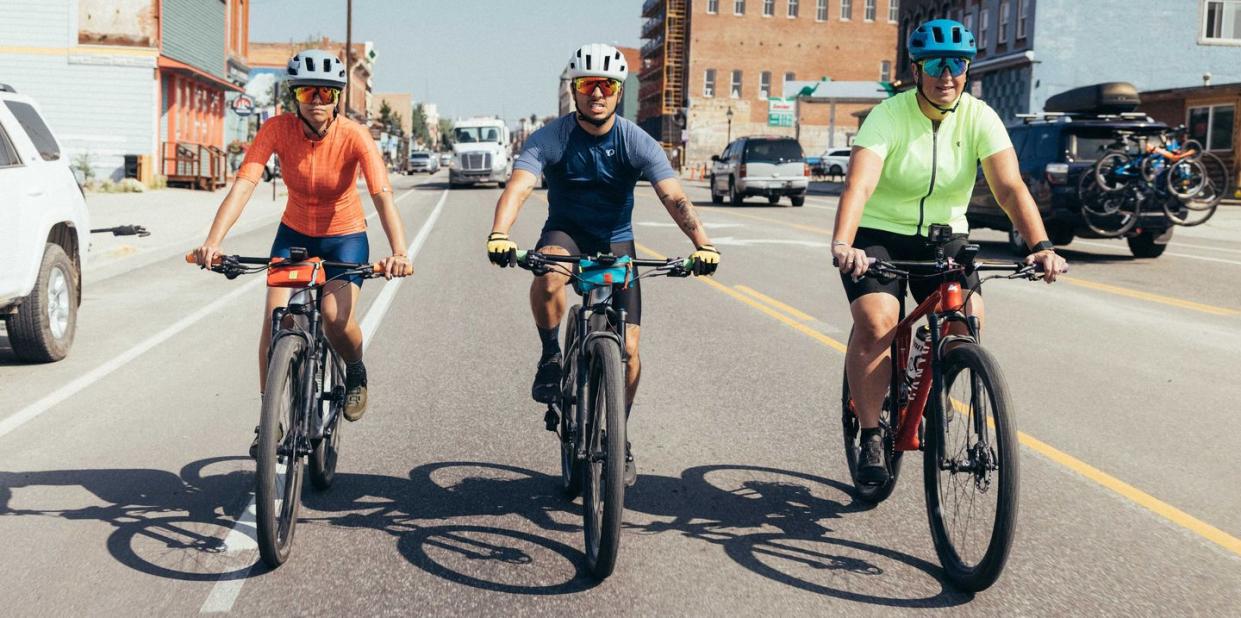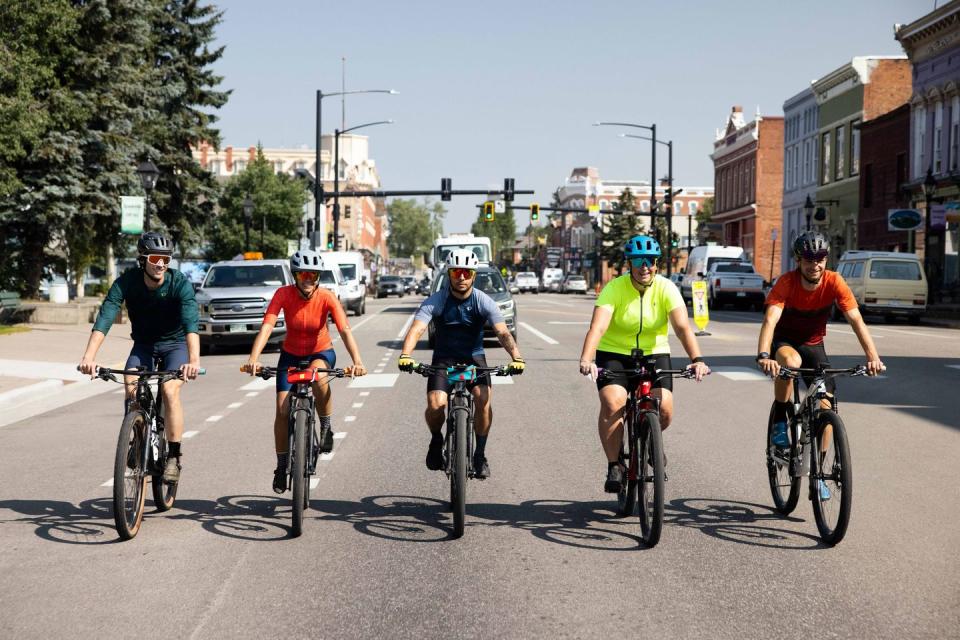These 3 Novice Cyclists Trained for and Raced in the Leadville 100 Mountain Bike Race

Five months ago, we told you the story of how professional cyclists Alexey Vermeulen and Ryan Petry were aiming to train three novice cyclists for the Leadville 100 Mountain Bike Race, arguably one of the most challenging mountain biking events out there, for their project, From the Ground Up. On August 14, Shawna Anderson, Enzo Moscarella, and Roberta Nuñez lined up with hundreds of others—professional mountain bikers and first-timers alike—for their first-ever bike race.
When Vermeulen and Petry concocted the idea more than a year ago, in an effort to get more people adventuring on bikes, they knew that they’d need to gain the trust of the three people they chose for the project. What they didn’t know, and what no one could possibly have predicted, was how the group would form a life-long bond. All five would be racing Leadville, and at the same time, they cared just as much about each other’s races as their own.
“I’m not the same person I was five months ago,” Anderson told Bicycling. “I’ve learned so much about myself, and I think it’s just amazing that I had the opportunity to do it.” Anderson, 48, lives in northern Wisconsin and works as a high school special education teacher. She almost always has purple hair, but for race week she dyed it an exceptionally bold lilac.
Moscarella, 35, an artist and decorative painter from Queens, New York, said that he had really hit a low point in his life, but From the Ground Up turned things around for him. And Nuñez, 31, from Boston, had only been working as an ER nurse for a year before the pandemic hit.
After Vermeulen and Petry visited each participant at their respective homes back in March, and delivered brand new Canyon mountain bikes and all the equipment they’d need to train, the two professional cyclists handed things over to the coaches. Wahoo Fitness Sufferfest—a coaching and training platform—signed on to the project, and all of the athletes were coached by Neal Henderson through the platform. They received workouts a week or two in advance, and they checked in with Henderson about everything from how to do intervals to how to use nutrition.
So, what were the biggest takeaways that Anderson, Moscarella, and Nuñez learned from this training process, and how did they fare at Leadville?
Have a positive attitude
In addition to the Sufferfest training, the three were in regular communication with Vermeulen and Petry about bike maintenance, race strategy, and general life check-ins. “There’s so much technical stuff and lingo, and sometimes we didn’t know if we were explaining things right,” Vermeulen said. “It’s so easy to overwhelm.”
But Anderson, Moscarella, and Nuñez always kept a positive attitude—they knew that everyone was only trying to help make them stronger and better. “I remember one time Neal [Henderson] had us do an FTP test, and I didn’t even know what it was,” Nuñez told Bicycling. “I did it wrong and it said that my FTP was 25, and I called Ryan and I was crying and said, ‘I’m never going to make it,’ and he said, ‘Roberta, that’s wrong, 25 is the FTP of a bird,’ and he talked me down.”
Along with the constant phone calls and online communication, all five met in-person twice in Colorado for training camps—once, in Boulder, and once in Leadville—so they could get a taste for riding at altitude and have some face-to-face time with the coaches. That’s when it became real for Anderson, Moscarella, and Nuñez.
“There was a moment in Boulder when we were climbing for like 17 miles, I was alone, I was cold, I hadn’t been eating, I didn’t know where I was,” Anderson said. “It looked like freakin’ Lord of the Rings with the fog in the valley and I thought, I can’t do this. But then here comes Alexey, and he talked me down off the ledge and it was fine.” Again, the power of a positive attitude.

The cycling community is more powerful than you can imagine
The social media outpouring from other cyclists was also overwhelming at first, but the three realized that they had gained a whole new community. “It was kind of crazy how at the beginning I got messages from people saying, ‘I’m so jealous that you got picked and I didn’t,’” Moscarella told Bicycling. “That turned into, ‘Yo, we are 100 percent on your team, good luck.’ It’s been amazing.”
“I have an aunt who sent me a message in July. She had just come back from a bike ride, and she said, ‘I rode the farthest I’ve ever ridden, and it was because of you!’” Anderson said. “And I’m like, that’s it. That’s what it’s all about. And now my uncle wants to go out and ride, too.”
For Vermeulen and Petry, that was the goal of the whole mission. “[These three] have done everything they possibly could to affect more than themselves, positively. Pros can’t always teach amateurs, but amateurs can teach amateurs.”
Even though Anderson, Moscarella, and Nuñez have had five months of non-stop access to tons of information and support, they’re still brand new to the bike scene, and now they want to help others find this community.
“There were so many questions that I was afraid to ask, like, clipless pedals...have clips? But now when I see someone else struggling or unsure, I want to guide them along—tell them, this is what you need, this is what you don’t need,” Moscarella said.
Anderson wants to take the energy from the race and the whole experience to get more people on bikes however they feel comfortable, “How do I capture this energy and momentum and keep going with it? How do I bring it to my corner of the world?”
And you don’t have to train for a 100-mile race. What all five have learned in this project is, it doesn’t matter how far or how fast you go, just go. “You’ll be better, the world will be better, it’s just taking that first step,” Anderson said.
Lean on those who know what you’re going through
The three riders became especially close because not many others in their lives understood what they were going through. “I’ve got a lot of really supportive people in my life,” Nuñez said, “but they don’t know how hard this has been, they don’t know how hard you have to work to accomplish something like this. After my 12-hour busy shift [as an ER nurse] I do have to train for two hours. I didn’t always want to, but I knew it would help my mental toughness and get me closer to my goal.”
“My commute is two hours,” Moscarella said, “and there were so many times when my day would start at 3:30 a.m. Go to the gym, eat breakfast, go to work, come home, work out, go to my cousin’s house, do some side work, and I remember texting [Shawna and Roberta] and just being like, ‘I’m dying here. I’m lonely and washed out, and I can’t even process this.’ And they’d be like, ‘you’re good.’ That’s all I would need—just hearing from them that we’re in this together.”
Even if you don’t finish, it doesn’t mean you failed
Vermeulen and Petry know well that no matter how much planning and preparation you put in, race day might not pan out the way you want it to. Sure, it would be great if all three finished the race with nothing but perfect results, but that didn’t happen. Not one of the three riders crossed the finish line in Leadville on August 14.
Anderson took a fall on a descent and decided to end her day with a few cuts and bruises. Nuñez also endured a crash, but kept riding. She and Moscarella both narrowly missed cut-off times on the course that forced them to stop early. Frustrating? Anti-climactic? Maybe. Discouraging? Not at all. After the race, all five decompressed with a good meal and conversation. No one was down, no one was defeated, all were happy to be together.
“I’ll be back 100 percent if I can be,” Moscarella said. “In the meantime, I’m headed back to the gym, I’ll be riding the bikes as much as possible and will continue to make positive improvements to my life.”
This is just the beginning
So where do they go from here? One thing is for sure for everyone—this is just the beginning of their cycling journeys.
“I was already really scared after our first training camp, about what post-race would look like for me,” Moscarella said. “It’s hard to think about going from all of this training and support, to having the race over. Ryan and Alexey and Neal will go back to their worlds. And I kind of panicked. I sent individual emails to everyone just asking what’s going to happen after the race.”
But Moscarella was reminded that sure, there will be some post-race emptiness, but then you set yourself up for the next race and the next goal. “I saw how much we accomplished in just five months. I like how I feel, mentally and physically, and now I get to build on that.”
Nuñez has her eye on gravel biking, while Anderson wants to give bikepacking a try. “I want to get out there and enjoy the ride,” Anderson said. “It kills me to ride [the Leadville course] and not take a thousand pictures, because it’s just gorgeous. There’s a ride in northern Wisconsin in October that I’d like to try—and I never would have done it before this, because I thought, I can’t ride 50 miles three days in a row. And now I’m like, that’ll be easy!”
And even though Vermeulen and Petry have barely had a moment of downtime, they’re fully prepared to take on another group of novice riders next year. “I’m already having dreams of these three coming back and helping us with the next round,” Vermeulen told Bicycling.
“We want to reach as many people as possible,” Petry told Bicycling. “For me, it’s all about getting people to try this sport. Because this sport brings a lot of positive change. It’s a whole feeling, it’s a wave that pushes you. This is about the people you meet, and the wanting to be healthier, and making positive decisions. It just lifts people’s lives, and that’s why this project exists. How do we lift more people’s lives? The bikes are just our vehicle, and the race is just an excuse and motivation to keep getting on the bike.”
You Might Also Like

